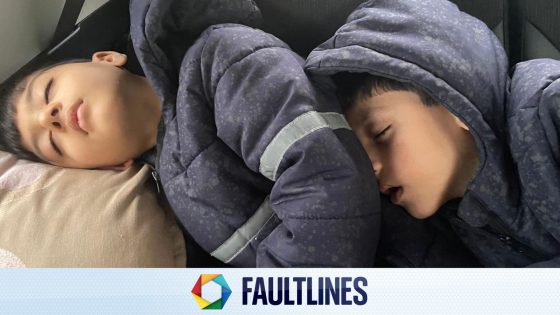It’s an icy cold December morning outside a Travelodge in Enfield, north London, when we first meet Nedret Batir.
She’s wearing a T-shirt, but seems oblivious to the temperature – only consumed with her obvious and immediate distress.
Everything she owns, along with her two daughters’ possessions, are packed up into suitcases in the corridor of the hotel.
She has just been evicted from her room and is now officially homeless.
There are dark circles under her eyes, and she looks pale, as she calls the council’s housing department.
She tells them she doesn’t know where she’ll sleep tonight, along with her girls, aged 11 and seven.
The man on the phone reassures her that they are looking for alternative accommodation and that she will have to wait.
But the panic is written all over her face. The clock is ticking.
“But I don’t have no place to leave my luggage,” she says, “because I have to go and pick up my children from school.”
The caseworker simply replies: “Yeah, that’s not my concern.”
‘Social cleansing’
Hers is a tale of desperation that has become normalised in England – but with a difference.
She has fallen victim to an out-of-area policy in place in this borough, and apparently across others in the capital, that moves families hours away from everything they know.
If two offers of accommodation are rejected, families are being told they are making themselves “intentionally homeless”.
And that is exactly what has happened to Nedret.
She has rejected a rental property in Hartlepool, five hours away from London. As a result, they have told her that they will be ending their duty to house her.
“I can’t take it anymore,” she tells me sobbing, “I don’t know what to do.”
She says she cannot tear her children away from where their father lives, where they go to school, and where she has support.
But the Enfield policy is written clearly, in an email, stating: “We will be finding homes for homeless families in parts of the country that are affordable to people on low incomes.
“The homes we offer will usually be a long way from Enfield, and outside southeast England.”
Housing campaigner Kwajo Tweneboa calls it “social cleansing”.
I show him the emails, the policy, the wording that is causing sleepless nights across the area, and probably the capital.
“It’s only affecting a certain group, those from low incomes,” he adds.
“Basically if you’re poor, get out. I’ve never seen it so, like in black and white. That is not what housing should be in the sixth richest economy in the world.”
Sky News has investigated and discovered that this is not just happening in London, it’s across the whole of England.
In every region, there has been a rise in the number of families with children being moved “out of area” into temporary accommodation.
Overall that figure has gone up in recent years by almost a quarter, according to our freedom of information requests.
‘I don’t have anybody here’
Abdullah Ahadi is already experiencing it first-hand, along with the isolation that being sent hours away can bring.
It’s 4.30am on a pitch-black March morning when we knock on his door in Corby, Northamptonshire.
He opens it, balancing on a walking stick, having been diagnosed with muscular dystrophy.
It’s silent on the estate, a warren of brick homes, and his is the only one with a light on inside.
He is being temporarily housed here with his wife and four children – who were born in London and grew up in Harrow, in the northwest of the capital.
Abdullah said: “They told me if you don’t accept this house, we will take your name from the list which says you need a house [so] I have no choice.”
But it means he must get up before dawn, to drive his children to school in Harrow, for what often becomes an eight-hour round trip.
As everyone piles into his car, he describes the loneliness.
“I don’t have anybody here. I worry about my kids. At the weekend they just stay inside the home.
As his six-year-old triplets, two boys and one girl, fall asleep – Abdullah’s 10-year-old daughter, Laaibah, describes the exhaustion of waking up so early.
“You can tell from my voice,” she says.
Articulate and softly spoken, she says she misses her friends, but admits she hasn’t told them about her living situation.
“They just know that I live far away.”
She also describes how she feels “different from people” in Corby.
“There’s not much Muslims there so every time I walk past, most people stare at me because of my hijab.”
It also weighs heavy on Abdullah’s mind that his condition is deteriorating – his muscles are “wasting day by day”.
He says: “If something happens to me, who is coming here to take care of the children? We have a lot of support from family and friends in London.”
I ask why he doesn’t move his children to a new school in Corby.
He replies that he doesn’t know how long the family will be there, as it’s supposed to be temporary.
And that hits at the heart of this. School is the only constant in these families’ lives, and they cling to it.
‘I just want to give up’
Nedret and her daughters are the same.
They have now been moved to Ilford, another hotel room; still in London – but a two to three-hour bus journey to their school.
Ebru, 10, says she is struggling to do her homework in a cramped room, and getting up early to do the commute is taking it out of her.
I tell her that her mother has described her as “brave”, and ask her if she feels it.
She replies: “Yes and no. At one point I do, and at one point I don’t, I just want to give up.”
Her sister Eda is also extremely tired.
By the time we reach their school, because of terrible traffic, and missing another bus, it is nearing 11am, or, as Eda says, “nearly playtime”.
None of these families, on low incomes, can find affordable private rentals, even when they do – it’s hard to act fast enough to secure them, such is the market.
A leaflet from Enfield Council explains the “severe shortage of accommodation for private rent” in London and the region.
It describes how it “is especially hard to find affordable homes for people on benefits or a low income”.
Local Housing Allowance rates and rents elsewhere are apparently “more closely aligned and so are affordable for residents”.
Eventually, six months after they first moved to Corby, Abdullah’s family is brought back to London, to Hounslow in the west of the capital.
With his condition, driving more than an hour to school one way is still taking its toll, but life is much better being closer to support.
But it’s temporary. And that’s the thing. At any point, they could be moved on.
Laaibah looks less tired when I meet her at the new “emergency accommodation”, a light and airy house under Heathrow Airport‘s flight path.
She is worried about where they will be moved to next.
“If I make friends here it will be temporary and if I move you never know if people are going to be rude to me, and it is just going to feel bad if you are lonely. If I move school it is going to be really hard to make friends,” she says.
Hunger and exhaustion
Seven months after Nedret was moved from Enfield to Ilford, we meet her in the same hotel room. Nothing, for her, has changed since the start of the year.
She says she has been spending money on taxis to school, and two buses back, and has run out.
“I can’t take my kids to school, I can’t buy them any food, my credit cards are full.”
Despite the school suggesting they move closer, Nedret says there are no spaces.
At one point she suggests to me she even regrets not accepting the original Hartlepool offer.
Ebru, meanwhile, looks exhausted too – describing the family’s hunger.
“When I’m in bed sometimes me and [my sister] can’t sleep because we’re starving and my mum can’t do anything.”
Her school attendance has also dropped to 51%.
“I can’t do anything about it”, Ebru tells me, looking upset.
She now sees a therapist but says they “just give me kind words, she’s telling me: ‘You’ll get through this’. But I don’t think so. I don’t think so at all”.
Unfortunately, no matter where they are sent the rental market will continue to be volatile – and increasingly inaccessible to the poorest.
Temporary accommodation alone is not the answer to Britain’s housing crisis.
Harrow Council said: “While we can’t comment on individual cases, we understand the stress and uncertainty that comes with the threat of homelessness or the increasing number of families that have become homeless.
“That’s why we ensure the support is there including financial assistance to secure their own accommodation in the private rented sector. We are facing unprecedented demand and currently supporting over 4,000 families a year who are under the threat of becoming homeless, and over 1,200 households in temporary accommodation.
“Like many local authorities we have a high demand for social housing and a shortage of temporary accommodation. Harrow has one the lowest stocks of social housing in London.
“When we can we look to offer accommodation within, or as close as possible to Harrow. However average rents in Harrow have increased by over 10.5% in just the last 12 months so this has made it even harder for families and the council to find affordable accommodation which is suitable for households who approach seeking our help. It is also hard to find emergency accommodation in neighbouring boroughs for the same reasons. We do everything we can find the most suitable homes for those in need of temporary accommodation, prioritising those with the most urgent need. Where we can’t offer something within the borough, we ensure that accommodation outside of the borough is suitable and meets their needs.”
An Enfield Council spokesperson said: “Despite extremely challenging financial conditions, we continue to do all we can to invest in Enfield to deliver positive outcomes for our residents. However, like many London boroughs, we are seeing a number of acute challenges including a shortage of social and affordable homes to rent.
“In line with other councils, we have moved to a national placement policy as a result of the extreme shortage of accommodation in London and the South East. Our priority is to find a suitable, permanent home for families as long-term hotel accommodation is neither appropriate, nor affordable. Hotel accommodation is incredibly costly and is damaging to the health and wellbeing of families which is why we must find alternative, suitable options. Given the dwindling supply of housing which is not set to improve in the near future, residents have been advised to be ready at short notice when a placement becomes available.
“Increasing numbers of families are turning to councils for temporary accommodation and financial support as homelessness reaches record highs. The scale of homelessness and impact on councils’ budgets mean we must manage these pressures whilst ensuring that homeless families are provided with appropriate housing, rather than unsuitable hotel accommodation.”
This is a special report in Faultlines, a Sky News series that aims to explore some of the biggest issues facing Britain ahead of the general election.
You can watch Adele Robinson’s full report today at 10.30am, 12.30pm, 2.30pm, 4.30pm, 6.30pm and 8.30pm on Sky News or on YouTube.
Source Agencies













